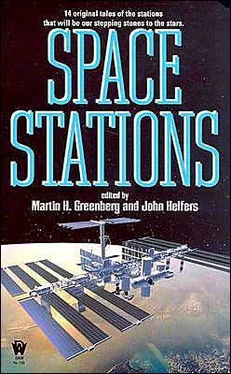The Consortium’s two robot supply ships with fuel and provisions were sending out electronic signals saying that the contents were intact, but one would be unwise to rely on the transmitted signals where one’s life depended on them.
Boutillier spoke up. “Why don’t we send Valkyrie down before Ares gets here. I volunteer to pilot it to the surface and plant our flag and fly back right away after video taping the flag planting event.” Noticing Okita and remembering the other partner in the expedition, he corrected himself quickly. “I mean—plant our flags.”
Eriksen was firm. “No, we are going to do it the way we have planned from the beginning. Being beaten in a race with the Consortium would not constitute a sufficient justification for not following our carefully made plans—especially, considering the imminent danger of a major sandstorm.”
He went on. “We must make Orbital Base Phobos a viable station first. For one thing, we must make sure that, if something should happen to Valkyrie, the remaining crew would still be able to make it back to Earth safely with the provisions from our supply ships. If our friends aboard Ares choose not to be cautious with their lives, that’s their problem.”
Nevertheless, Eriksen ordered Valkyrie to be detached from Trailblazer and ready for departure for Mars on short notice. Even in the low gravity of Phobos, the inertial mass of Valkyrie was considerable and it was a delicate operation. The heavy work was pretty much automated, however.
“I’m almost certain now a severe local storm is gathering on the surface where Ares will be landing. I’ve just given Roel van Dijk a second warning but I don’t think he’ll believe me,” Hoerter said with frustration.
Boutillier was still raring to go. “I’m game for flying down in Valkyrie. Anyone who wants to come along for the ride’ll be welcome. I don’t insist on being the first to step out of the ship either. We can toss a coin. After planting the flags, we’ll head back immediately if the surface condition looks threatening. We can still be the first on Mars.
The rest of us can take turns going down to the surface later.”
Boutillier was obviously trying to avoid the accusation that the reason why he was proposing this quick trip down was to become the very first man to walk on Mars (as Neil Armstrong had become the first man to walk on the Moon in July 1969) and thus to become immortalized in history. He was anxious to be the first, but he was even more eager to make sure that Trailblazer would not be beaten to the first place.
Eriksen was unsympathetic. “No go, Jack. Linde, keep me posted on the gathering storm on Mars. Let’s all get back to turning Phobos into a working orbital base first. Even if we don’t get to be the first to land on Mars, we are going to be the first to do it right. In the long run, setting up an orbital base on Phobos will be more important in the exploration of the Red Planet than just planting the flags first. Especially, if we are going to terraform Mars someday for serious human exploration.”
Several days later, the business of setting up a habitat on Phobos was nearly complete, but the surface conditions on Mars looked ever more perilous, at least in the opinion of Hoerter. Ares was about to enter Mars’ vicinity, taking trajectory to land at a location marked by the transmission beam from their waiting supply ship.
Eriksen offered Ritter a safe haven on Orbital Base Phobos to wait out the gathering storm on Mars, but the gesture was politely declined. The storm had not picked up significant force yet and the Ares team wanted to make it to the surface, get the provisions from the robot ships, and be hunkered down there if indeed a storm should become a threat. If it started looking ominous enough, they could leave the surface after loading up the provisions and get into a Mars orbit and wait for several months until the orbital configuration for Earth became appropriate for the journey home.
The message that Ares was about to land on Mars was received at the Phobos base with mixed emotions, mostly with a sense of frustration and even resentment. Trailblazer could have been the first, but Eriksen would not risk his expedition team. If he did not have complete faith in the scientific predictions of his Martian atmosphere expert, he was nevertheless unwilling to take a chance that Hoerter was wrong.
At the present distance of Earth, those back home would be receiving this epoch-making report in several minutes. What a depressing thought. To be so close to making a genuine historic first and ending up being a second team in. No one will remember us, Boutillier thought furiously.
Some minutes later, back on Earth at the Headquarters of the European Space Agency in Paris, the Director General, Professor Dominique Laget was listening to the live news retransmitted from the receiving station in Villafranca near Madrid. The video screen on the great wall of the conference room would soon be showing the Martian surface from the television camera on Ares. Upon hearing the report that their ship was about to land on Mars, his distinguished face brightened in an inimitable Gaulish smile. He was joined by several dozen ranking officials of the Consortium that included a number from the Russian Federation.
Laget’s pert strawberry-blonde secretary from Brittany started filling up the champagne glasses with the finest produce from the Champagne province. The same scene was being repeated all over Europe, with some variations in the choice of beverages. The entire subcontinent of Europe was ready to have the greatest festivities ever.
By design, the landing would take place when the side of Mars with the landing site was facing Earth.
It was only seconds before Ares was actually to make a touchdown that the transmission suddenly broke down. The last scene from the video camera on Ares showed an
immense tornadolike dust cloud rapidly approaching the spaceship over the barren wasteland of Mars. The last vocal transmission received, just before the communication was cut off, said, “We are about to be overtaken by a great tornado. We will…” Ritter never got to complete his sentence.
After what seemed like an eternity of waiting, television and radio broadcasters were announcing that the transmission from Mars had been disrupted by unexplained technical difficulties.
After a while, in place of the direct report from Ares, there came a transmission from Orbital Base Phobos. They had had to wait a few hours for it, as the Martian moon had gone behind its mother planet in its approximately 0.31 day orbit.
As soon as Phobos was over the horizon for the line-of-sight contact with Ares, Captain Eriksen reported to Earth with a sense of foreboding. “We have no radio contact with Ares—no visual sighting either. The area surrounding the landing site is near the center of an immense dust cloud. We’ll try making radio contact and keep looking for a break in the sandstorm.”
Aboard Trailblazer, the crew huddled for a conference.
“What’s your diagnosis now, Linde? Will the storm clear up anytime soon?” Eriksen asked.
“The storm appears to be local and relatively minor. We lack sufficient data about such events on Mars and it’s hard to tell. There’s an indication, though, that it may be clearing up. We need to keep watching.”
“It’s troubling there’s no radio contact with Ares. The storm may have damaged the communications antennae,” Boutillier interjected his thoughts.
Eriksen looked grave. “What worries me most is whether the ship itself is still intact. I don’t think it was designed to cope with a sandstorm like that. I’m concerned about the safety of her crew.”
Another orbit later, there still was no communication from Ares despite repeated attempts at contact from both Trailblazer and the Consortium’s control antennae on Earth. All receiving stations around the globe were intently listening in for any signal from Ares. In the meanwhile, the Trailblazer crew worked around the clock to complete the refitting of the supply ships as a habitat so that they could house refugees from Ares if any were rescued.
Читать дальше












